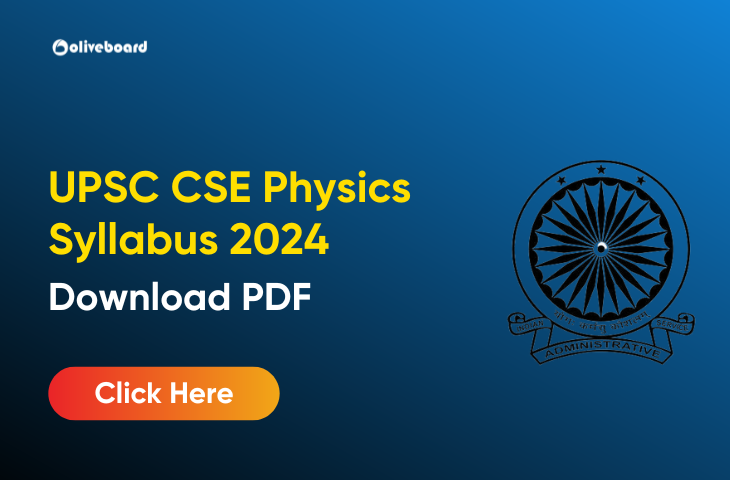UPSC Physics Syllabus 2024
The UPSC Physics syllabus 2024 covers a wide range of core concepts including classical mechanics, thermodynamics, electromagnetism, optics, relativity and quantum mechanics. Candidates are tested on their conceptual grasp of physical theories and ability to apply principles to problem solve real-world scenarios. The paper evaluates critical thinking, analytical reasoning and mathematical skills.
You can download the UPSC CSE Physics Optional paper syllabus from the direct link given below.
UPSC Physics Syllabus 2024 Overview
There is a list of optional subjects for mains in which there are 48 subjects, from which candidates can choose according to their choice. Physics is one of the optional subjects for the Civil Services Exam conducted by UPSC. The optional paper is conducted for 250 marks. The UPSC CSE optional subject Physics Syllabus 2024 has two papers, Paper 1 and Paper 2.
Optional Physics Syllabus for UPSC CSE 2024
The UPSC Physics syllabus covers advanced concepts like thermodynamics, electromagnetism, quantum mechanics and semiconductors. It is suitable for those with a graduate level physics background. Strong conceptual grasp and problem-solving skills are tested in this highly specialized optional subject.
If you opt for Physics optional in UPSC mains, prepare it thoroughly. Go through the UPSC CSE Syllabus and previous years’ Physics papers. Also study relevant Physics books for UPSC preparation.
UPSC CSE Physics Syllabus 2024 Paper 1
1. Mechanics:
- Mechanics of Particles:
- Laws of motion
- Conservation of energy and momentum
- Motion under central force
- Gravitational field and potential
- Rutherford scattering
- Mechanics of Rigid Bodies:
- Centre of mass, angular momentum
- Equations of motion
- Elastic and inelastic collisions
- Molecular rotations
- Precessional motion
- Mechanics of Continuous Media:
- Elasticity and Hooke’s law
- Streamline flow and viscosity
- Special Relativity:
- Lorentz transformations
- Length contraction, time dilation
- Mass-energy relation
2. Waves and Optics:
- Waves:
- Simple harmonic motion
- Beats, resonance
- Stationary waves
- Geometrical Optics:
- Laws of reflection and refraction
- Matrix method in paraxial optics
- Chromatic and spherical aberrations
- Interference:
- Young’s experiment
- Newton’s rings
- Michelson interferometer
- Diffraction:
- Fraunhofer and Fresnel diffraction
- Diffraction grating
- Polarisation and Modern Optics:
- Polarised light
- Optical activity
- Fibre optics
- Lasers and holography
3. Electricity and Magnetism:
- Electrostatics and Magnetostatics:
- Laplace and Poisson equations
- Method of images
- Dielectrics, polarisation
- Biot-Savart and Ampere’s laws
- Current Electricity:
- Kirchhoff’s laws
- Faraday’s and Lenz’ laws
- Inductance
- Electromagnetic Waves and Blackbody Radiation:
- Maxwell’s equations
- Displacement current
- Electromagnetic waves
- Blackbody radiation
4. Thermal and Statistical Physics:
- Thermodynamics:
- Laws of thermodynamics
- Entropy changes
- Phase rule and chemical potential
- Van der Waals equation
- Statistical Physics:
- Maxwell-Boltzmann, Bose-Einstein, and Fermi-Dirac distributions
- Specific heat of gases
- Blackbody radiation
- Maxwell relations
UPSC CSE Physics Syllabus 2024 Paper 2
1. Quantum Mechanics:
- Wave-particle duality
- Schroedinger equation and expectation values
- Uncertainty principle
- Solutions of one-dimensional Schroedinger equation
- Reflection and transmission by potential barriers
- Angular momentum
- Hydrogen atom
- Spin-half particles and Pauli matrices
2. Atomic and Molecular Physics:
- Stern-Gerlach experiment and electron spin
- Fine structure of hydrogen atom
- Spectroscopic notation and Zeeman effect
- Rotational, vibrational, and electronic spectra of diatomic molecules
- Raman effect and molecular structure
- Fluorescence, phosphorescence, NMR, and EPR
- Lamb shift and its significance
3. Nuclear and Particle Physics:
- Basic nuclear properties and semi-empirical mass formula
- Shell model of the nucleus and nuclear forces
- Violation of parity in beta decay
- Gamma decay, internal conversion, and Mossbauer spectroscopy
- Nuclear fission, fusion, and energy production in stars
- Classification of elementary particles, quark structure of hadrons
- Physics of neutrinos and unification of forces
4. Solid State Physics, Devices, and Electronics:
- Crystalline and amorphous structure of matter
- X-ray diffraction and electron microscopy
- Band theory of solids and thermal properties
- Magnetism: dia, para, and ferromagnetism
- Superconductivity and high-temperature superconductors
- Semiconductors, transistors, amplifiers, and oscillators
- Digital electronics, logic gates, and microprocessors
Thorough preparation of topics like semiconductors, communications, instrumentation and measurement is crucial. Candidates must develop skills for structured writing concisely within the word limit. Ample practice of derivations, numericals and previous years’ question papers is key to mastering this highly mathematical optional subject. Strong fundamentals and problem-solving abilities are essential to maximize scores.
| Important Links | Important Links |
| UPSC CSE 2024 Apply Online | UPSC CSE 2024 Notification |
| UPSC CSE Eligibility Criteria | UPSC CSE Syllabus |
| UPSC CSE Exam Pattern | UPSC CSE Selection Process |
UPSC CSE Physics Syllabus 2024 FAQs
The UPSC Physics syllabus 2024 covers a wide range of core concepts including classical mechanics, thermodynamics, electromagnetism, optics, relativity and quantum mechanics. Candidates are tested on their conceptual grasp of physical theories and ability to apply principles to problem solve real-world scenarios. The paper evaluates critical thinking, analytical reasoning and mathematical skills.
Get Syllabus PDF here: UPSC CSE Physics Syllabus
There is 250 marks is for one optional paper.

Hello, I’m Aditi the creative mind behind the words at Oliveboard. As a content writer specializing in state-level exams, my mission is to simplify complex exam information and help aspirants navigate their journey with clarity and confidence.
Having walked the path of an aspirant myself, I bring a unique, relatable perspective to my work. I focus on crafting accessible and accurate content on Exam Notifications, Admit Cards, and Results, ensuring candidates have the right information at the right time.
At Oliveboard, I play a key role in empowering students by breaking down the exam process into understandable and actionable insights. My aim is to make preparation less daunting and more rewarding, one well-informed step at a time.
